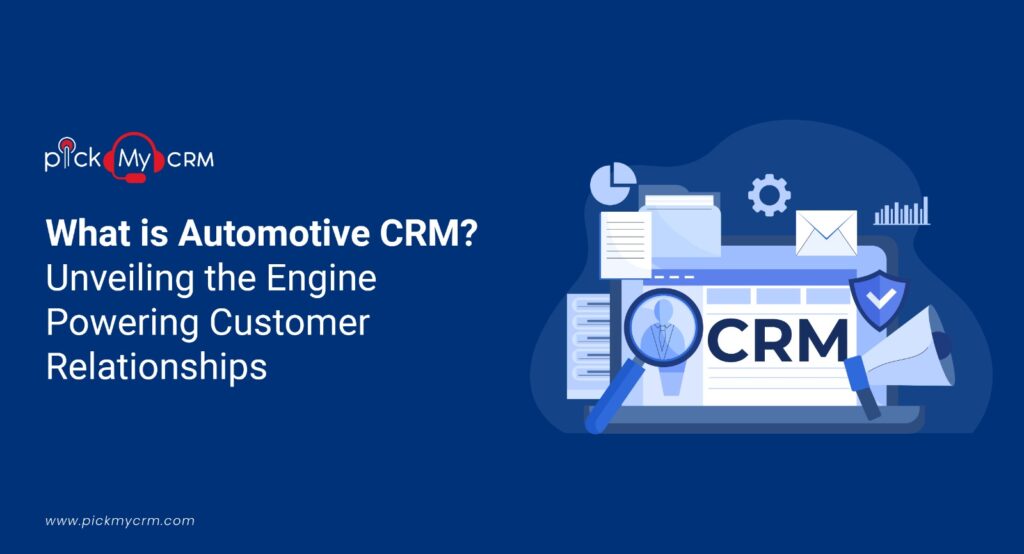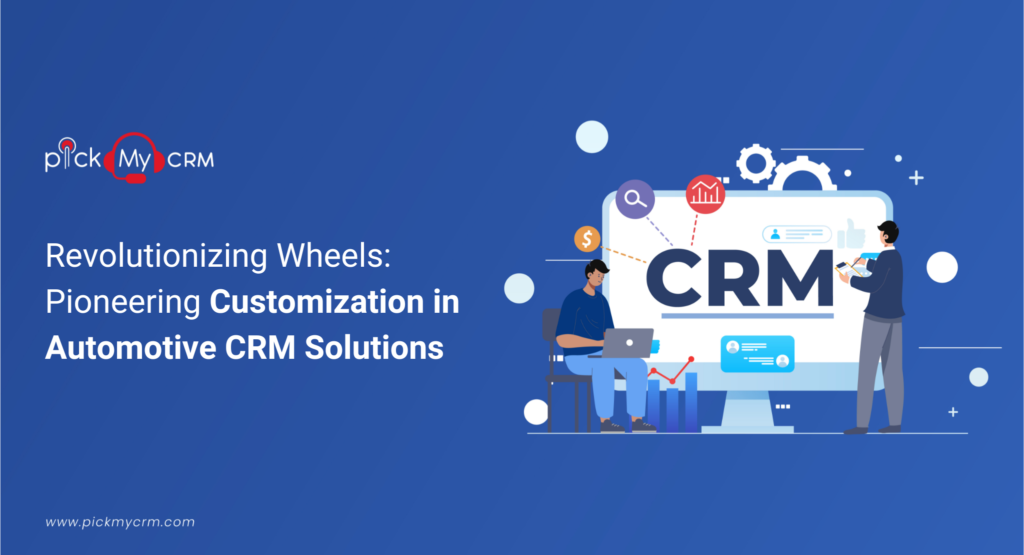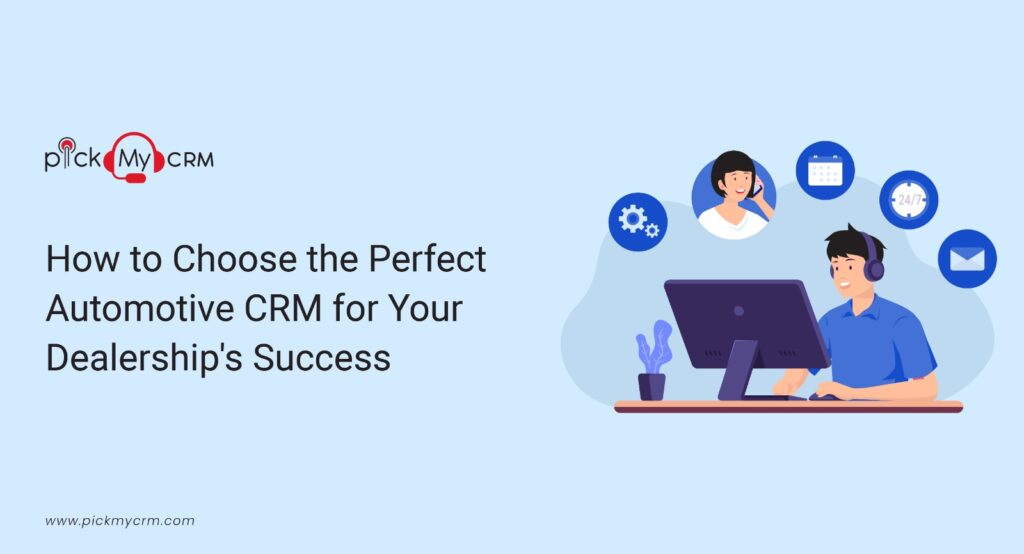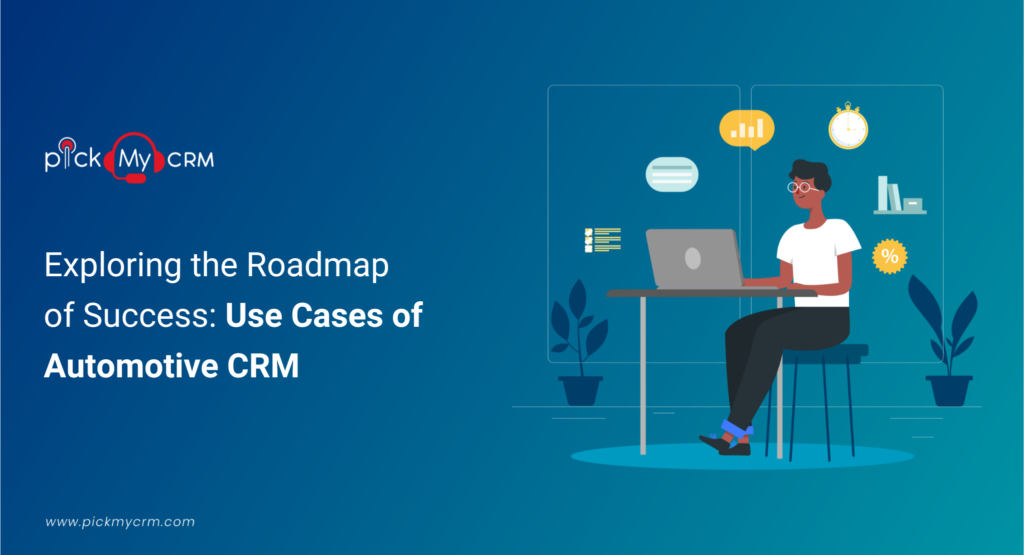What is Automotive CRM? Unveiling the Engine Powering Customer Relationships
Recent Stats and Trends
Before we dive into the nuances of Automotive CRM, let's take a quick look at some recent statistics and trends that underscore its significance, The Rise of Personalization In a recent survey by Industry Insider, 78% of automotive consumers expect personalized dealership experiences, highlighting Automotive CRM's unique ability to meet this demand. Growing CRM Adoption In the last two years, the adoption of CRM systems in the automotive industry has surged by 30%. It shows that businesses are increasingly recognizing the value of CRM in enhancing customer relationships and driving revenue. Customer Retention Impact In a study by Auto Trends Research, Automotive CRM users saw a remarkable 15% boost in customer retention rates, underscoring CRM's prowess in fostering enduring customer relationships.What is Automotive CRM?
Automotive Customer Relationship Management (CRM) encompasses strategies, practices, and automotive CRM software solutions designed to manage and enhance interactions between automotive companies and their customers. It leverages data-driven insights to provide a comprehensive view of customer behavior, preferences, and needs, ultimately leading to personalized and targeted interactions. From initial inquiries to post-purchase support, Automotive CRM encompasses the entire customer journey, aiming to foster loyalty, satisfaction, and repeat business.Why is Automotive CRM Indispensable?
In the hyper-competitive and data-rich landscape of the automotive industry, Automotive Customer Relationship Management (CRM) stands as an indispensable compass guiding businesses toward success. As customer expectations evolve and global vehicle sales surge, CRM empowers automotive companies to forge meaningful connections, anticipate needs, and tailor experiences that resonate. By harmoniously melding data insights with personalized interactions, CRM not only elevates customer satisfaction but also propels the growth of revenue. Fortify a steadfast position in an ever-evolving market.How Does Automotive CRM Work?
Automotive CRM systems work by Centralizing customer data from various touchpoints, including website inquiries, phone calls, emails, and in-person interactions. This data is then organized and made easily accessible to dealership staff. Below is a streamlined summary of the process,- Data Collection: Customer information is collected from multiple sources and integrated into the CRM system.
- Data Segmentation: Data undergoes categorization into segments like customer type, purchase history, and preferences, enhancing clarity and facilitating in-depth analysis.
- Automated Communication: CRM software automates communication processes, sending personalized messages, service reminders, and marketing offers to customers.
- Lead Nurturing: Leads are assigned scores and prioritized, Enabling sales teams to concentrate their efforts on the most promising prospects.
- Performance Tracking: Dealerships can measure the effectiveness of marketing campaigns, sales efforts, and customer service through comprehensive reporting tools.
Who Benefits from Automotive CRM?
- Manufacturers: Gain insights into market trends, enabling them to tailor their offerings to match consumer demands and stay competitive.
- Dealerships: Efficiently manage leads, nurturing them into conversions while building lasting relationships through personalized interactions.
- Service Centers: Utilize CRM to provide exceptional after-sales service, addressing customer issues promptly and enhancing overall satisfaction.
- Sales Teams: Access detailed customer profiles and interactions, enabling them to make more informed and personalized sales pitches.
- Marketing Teams: Leverage customer data to create targeted marketing campaigns that resonate with specific customer segments.
- Customers: Enjoy personalized experiences, timely support, and streamlined processes, leading to higher satisfaction and loyalty.
- Business Owners: Witness improved sales performance, streamlined operations, and enhanced customer loyalty, contributing to sustainable growth.
- Executives: Gain insights into customer behaviors and preferences, facilitating informed decision-making and strategic planning.
- Brand Reputation: Enhanced customer experiences through CRM lead to positive word-of-mouth and contribute to a strong brand reputation.
Benefits of Automotive CRM
- Efficient Lead Management: Streamline lead capture, assignment, and tracking for higher conversion rates.
- Enhanced Customer Engagement: Enable personalized communication and targeted marketing for increased satisfaction and loyalty.
- Streamlined Operations: Automation features reduce manual data entry, optimize workflows, and eliminate redundancy, freeing up Time for staff to focus on high-value tasks.
- Effective Service Management: Deliver prompt, personalized customer support for happier clients.
- Data-Driven Decisions: Robust analytics and reporting tools provide insights into sales performance, customer behavior, and market trends, aiding in informed decision-making.
- Customized Marketing: CRM systems utilize customer insights to create targeted marketing campaigns, leading to higher engagement and conversion rates.
- Predictive Insights: Data-driven predictions enable proactive service offerings, ultimately fostering brand loyalty.
Features of Automotive CRM
- Lead Management: Capture, assign, and track leads efficiently to optimize the sales process.
- Contact Management: Store and access customer data, including preferences and history.
- Sales Automation: Streamline the sales process with automated follow-ups, quotes, and appointment scheduling.
- Service Management: Manage service appointments and track service history for improved customer support.
- Analytics and Reporting: Customize reports and dashboards for monitoring performance.
- Mobile Accessibility: Access CRM data and perform tasks on mobile devices for on-the-go productivity.
- Integration Capabilities: Seamlessly connect with other software and tools.
- Security: Ensure data privacy and security with encryption and access controls.
- Customization: Tailor the CRM to your dealership's unique workflows and processes.
When and Where is Automotive CRM Effective?
Automotive Customer Relationship Management operates as a dynamic bridge across time and place, proving its effectiveness in scenarios. Its impact is felt not only in the hustle and bustle of urban showrooms but also in the virtual spaces of online platforms. From initial model inquiries to ongoing post-purchase support, CRM seamlessly integrates across automotive touchpoints. Flexibly adjusting to various settings, guarantees individualized journeys for every customer. In the worldwide automotive arena, Automotive CRM defies borders, reshaping dealerships into hubs of customer-centric engagement. Whether amidst bustling cities or serene rural landscapes, it caters to global customer needs, fostering brand loyalty. Beyond physical locations, its effectiveness expands digitally, a crucial asset for businesses thriving in today's interconnected landscape shaped by evolving automobile interactions.Types of Automotive CRM
- Sales CRM: Manages leads, Conversions, and Sales interactions to optimize the sales pipeline.
- Service CRM: Focuses on after-sales support, warranty management, and issue resolution.
- Marketing CRM: Segments customer data for targeted campaigns and tracks marketing effectiveness.
- Analytical CRM: Derives insights from customer data to inform decision-making and strategy.
- Collaborative CRM: Facilitates cross-departmental communication and information sharing.
- Operational CRM: Streamlines the orchestration of customer data, sales, and service processes through automation.
- Strategic CRM: Synchronizes customer interactions with overarching long-term business objectives.
- Mobile CRM: Enables access to CRM data on mobile devices for remote productivity.
- Social CRM: Integrates social media interactions and insights into the CRM system.
- Cloud-based CRM: Hosts CRM software on the cloud for flexibility and accessibility.
Implementing Automotive CRM: A Strategic Approach
- Assess Your Needs: Before selecting an Automotive CRM system, carefully assess your business requirements. Consider factors like the size of your dealership, the number of employees, and the complexity of your operations.
- Select the Right CRM: Choose a CRM system that aligns with your business goals and objectives. Ensure it offers the features and scalability needed to support your growth.
- Training and Adoption: Implementing a CRM system necessitates thorough team training. Ensure all staff are proficient with the software for maximum benefits.
- Data Migration: When transitioning or moving from manual methods, smooth data migration is crucial. Ensure continuity by seamlessly transferring customer data.
- Continuous Monitoring and Optimization: Regularly monitor CRM usage and gather feedback from your team. Adjust your strategies and configurations as needed to optimize CRM performance.
The Impact of Automotive CRM on the Industry
Automotive CRM is profoundly reshaping the industry by pivoting away from transactional exchanges towards fostering enduring customer relationships. This shift yields heightened customer loyalty, Reduced customer acquisition costs, and a more streamlined and efficient sales process.Common Misconceptions About Automotive CRM
While Automotive CRM offers numerous benefits, there are also some common misconceptions surrounding its implementation and effectiveness. Let's address these misconceptions to provide a more balanced perspective, CRM is Only for Large Dealerships Commonly, it's believed that only large dealerships benefit from CRM systems, but these tools are adaptable to businesses of all sizes and budgets. CRM Isn't Exclusive to Sales Automotive CRM systems go beyond aiding sales teams; their influence reaches across departments, benefiting marketing, service, and customer support teams by offering valuable insights and facilitating personalized interactions. CRM is Too Expensive Implementing CRM need not strain your budget. Numerous budget-friendly CRM solutions are accessible, catering to a broad spectrum of automotive businesses.Top automotive CRM companies
In the dynamic world of the automotive industry, leveraging the right CRM system can make all the difference in building strong customer relationships and optimizing business operations. Here, we present some leading Automotive CRM Software systems that revolutionize how automotive companies connect with their customers.Salesforce Automotive Cloud
Overview: Salesforce Automotive Cloud is a comprehensive CRM solution tailored for the automotive industry. It empowers businesses to streamline customer interactions, enhance sales processes, and provide exceptional service. Benefits and Features- Lead Management: Capture, track, and nurture leads for improved conversion rates.
- Sales Automation: Automate sales processes from quotes to contracts.
- Service Excellence: Manage warranties, service requests, and support cases effectively.
- Predictive Insights: AI-powered analytics help anticipate customer needs.
- Customization: Tailor the platform to your business needs.
- Pricing starts at $75-$150 per user per month.
HubSpot CRM
Overview: HubSpot CRM offers an intuitive interface and powerful features for managing customer relationships, leads, and marketing efforts. Benefits and Features- Lead Tracking: Organize and track leads for effective follow-ups.
- Contact Insights: Gain a comprehensive view of customer interactions.
- Email Campaigns: Create targeted email campaigns for lead nurturing.
- Customer Support: Manage issues and provide timely support.
- Integration: Seamlessly integrate with other HubSpot tools.
- The free version is available.
- Paid plans start at $50 per month.
Microsoft Dynamics 365 Automotive
Overview: Microsoft Dynamics 365 Automotive offers an integrated CRM platform with sales, service, and collaboration capabilities. Benefits and Features- Customer Insights: Centralized customer data for informed decision-making.
- Sales and Service Automation: Streamline sales and after-sales service processes.
- Unified Platform: Seamlessly integrate CRM with other Microsoft tools.
- Reporting and Analytics: Gain insights into sales and customer behavior.
- Customization: Tailor the system to specific needs.
- Pricing starts at $65-$180 per user per month.
Zoho CRM Automotive
Overview: Zoho CRM Automotive is a specialized solution Crafted for automotive enterprises, providing lead management and multi-channel communication capabilities. Benefits and Features- Lead Management: Track and manage leads for sales optimization.
- Opportunity Tracking: Monitor opportunities and sales pipeline.
- Multi-Channel Communication: Engage customers through various channels.
- Customizable Modules: Adapt the CRM to suit your business needs.
- Integration Options: Connect with other tools and applications.
- Pricing starts at $14-$40 per user per month.




